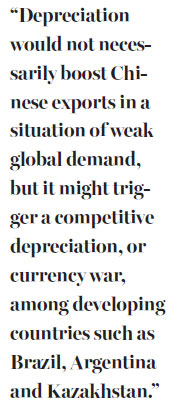Stable renminbi benefits China
Updated: 2016-03-18 08:40
By Chai Qingshan(China Daily European)
|
|||||||||
There are good reasons for the country to avoid pursuing depreciation and to manage currency's fluctuation against the dollar
It has been common recently for some analysts and economists to advocate the depreciation of the renminbi, based on their understanding that the Chinese currency has been overvalued for a few years. In the belief that devaluation could stimulate exports and reduce the risks of deflation, some even suggested a drop of 10 to 20 percent.
However, the central bank appears not to support this idea.
The People's Bank of China has taken many measures to stabilize the value of the renminbi since Aug 13. Zhou Xiaochuan, its governor, has said China can maintain stability of renminbi exchange rates instead of pursuing devaluation.
What the central bank is doing is correct, because it is indeed dangerous to depreciate sharply.
Depreciation would not necessarily boost Chinese exports in a situation of weak global demand, but it might trigger a competitive depreciation, or currency war, among developing countries such as Brazil, Argentina and Kazakhstan.
Devaluation of the renminbi would lead to some emerging countries depreciating their currencies. The situation is similar to that of the Asian financial crisis in 1997-99. Even though China's economy faced difficulties then, premier Zhu Rongji insisted on maintaining the renminbi's value. One of the reasons is that the effect of yuan depreciation on exports is small, but triggering a currency war would damage China's international image.
This is also why Zhou reiterates that China will not competitively depreciate its currency. He points out that China's trade surplus last year was more than $500 billion (443 billion euros). The country's net exports have played an important role in driving economic growth.

Sharp depreciation of the renminbi would boost expectations that the currency's value would fall further, causing investors to adopt a bearish attitude toward China's equity market. Share prices may plummet continuously once domestic liquidity is low.
A lot of analysts also say sharp depreciation of the renminbi would make investors, especially Western investors, more pessimistic about China's economy and cause them to sell stocks. Meanwhile, businesses and Chinese residents would buy more foreign-currency assets and try to reduce their foreign currency-denominated debts. That would force the central bank to increase its supply of foreign currencies, and hence buy back renminbi.
In this situation, if the central bank injected liquidity through the open market and lowered commercial banks' deposit-reserve ratio in time, the shock on the stock markets might be smaller. However, if the central bank failed to act in time, which might increase market worries about liquidity shortages and higher interest rates, share prices would drop, or even slump. The stock market crashes of August, December and January were hard lessons.
Depreciation of the renminbi is a double-edged sword. Traditionally, the drop benefits exports, but harms imports and enthusiasm among Chinese for studying overseas.
A weaker yuan would also harm domestic enterprises' overseas investments, and mergers and acquisitions. In addition, a weaker yuan would be less welcome during overseas settlements. This would be unfavorable for promoting the Belt and Road Initiative and internationalization of the yuan. In this sense, depreciation of the renminbi is not necessarily a good thing.
To maintain stability in the yuan's exchange rate, the central bank should not only stick to the renminbi's stability against a basket of currencies, but also keep it stable against the US dollar.
Chinese people, media and enterprises pay more attention to the renminbi's exchange rate against the dollar, as almost 70 percent of overseas trade is settled in dollars, and about 70 percent of enterprises and residents' foreign currency savings are in dollars.
So, when gauging the renminbi's exchange rate trend, Chinese business owners and residents tend to look at the dollar rather than a basket of foreign currencies. In this sense, if the renminbi's value is depreciated too fast against the dollar, many people will believe that the currency is depreciating even if its value remains stable against a basket of foreign currencies.
Meanwhile, most residents and enterprises' foreign currency debts are also denominated in dollars. They would like to buy dollars to repay their dollar debts.
In addition, a lot of countries' currencies are linked to the dollar's value. Although the renminbi's value is determined with reference to a basket of currencies, the dollar is still the most important yardstick to look at. This explains why Zhou, the central bank governor, makes it clear that while China is determined to set the exchange rate in accordance with the basket of currencies, the government will try to manage renminbi fluctuation against the dollar.
The author is vice-president of the People's Bank of China's Zhengzhou Training Institute. The views do not necessarily reflect those of China Daily.
Today's Top News
Inspectors to cover all of military
Britons embrace 'Super Thursday' elections
Campaign spreads Chinese cooking in the UK
Trump to aim all guns at Hillary Clinton
Labour set to take London after bitter campaign
Labour candidate favourite for London mayor
Fossil footprints bring dinosaurs to life
Buffett optimistic on China's economic transition
Hot Topics
Lunar probe , China growth forecasts, Emission rules get tougher, China seen through 'colored lens', International board,
Editor's Picks

|

|

|

|

|

|







